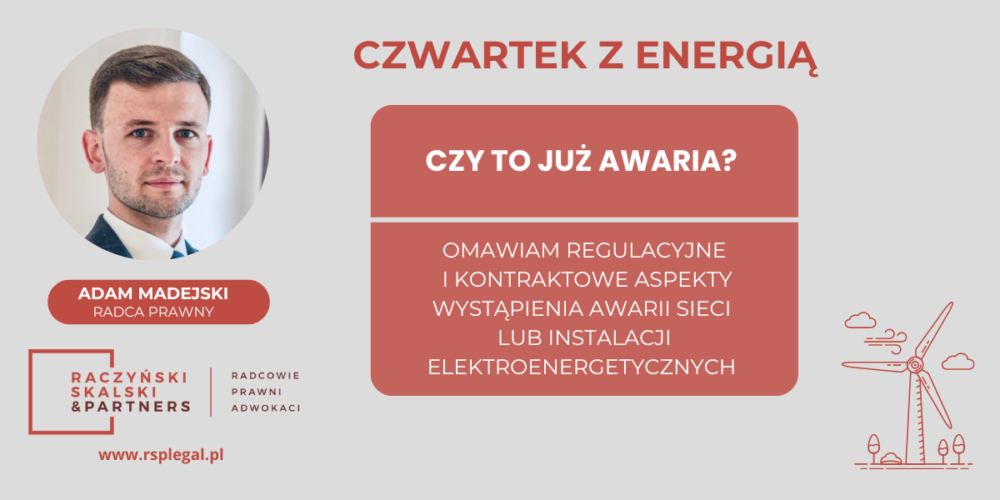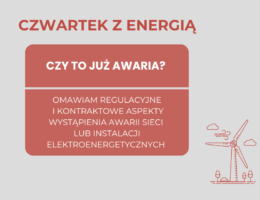Power grid failures affect sellers, generators as well as electricity consumers without exception. From the regulatory side, this issue is not particularly elaborated – fairly detailed regulations can be found primarily in the instructions for network operation and maintenance. On the contractual side, on the other hand, the issue of failure is most often equated with the occurrence of force majeure, although sometimes it imposes liability and obligation to repair the damage on one of the parties.
1. The concept of failure in the energy law
In both the Energy Law and the Renewable Energy Sources Law, the issue of failure, both in the power grid and in relation to generation equipment, is not explicitly regulated. We will find neither definitions nor provisions in these laws directly referring to the causes of occurrence and responsibility for the consequences of failure.
From a practical point of view, such a state of affairs is justified, since the multitude of factors that can cause failures makes it decidedly difficult to construct regulations in such a way that no participant in the energy market could potentially be disadvantaged or placed in an inferior contractual or negotiating position.
More extensive information on the failures themselves and how to deal with them can be found in the network operation and maintenance manuals. First of all, they include a distinction between network failure and system failure. A network failure is: An operating event that results in the synchronous shutdown of a part of the NPS that produces or draws electricity from the grid in an amount not exceeding 5% of the current power demand of the NPS. A system failure, on the other hand, is the same traffic event, but affecting more than 5% of the current power demand of the NPS.
In other respects, the instructions for network operation and maintenance include provisions for failure in the context of:
-
-
- determination and transmission of measurement data,
- malfunction of installations, networks and equipment of end users,
- the extension of the deadline for the performance of the parties’ obligations,primarily the obligations of the system operator,
- the possibility of introducing restrictions or other measures to minimize risks to the power system,
- management of generating units.
-
Most often, a breakdown occurs as a side event, that is, its occurrence causes certain procedural consequences. Consequently, it can be considered that when attempting to contractually regulate the consequences of a breakdown, the parties have quite a lot of freedom to form mutual rights and obligations.
2. Failure in contractual terms
Failure of a network, installation or other equipment associated with the operation of the power system can have a variety of consequences – from negligible to catastrophic. This makes it all the more important that the parties to contracts for electricity-related services properly and convergently understand the concept of failure itself, as well as the consequences that are associated with its occurrence.
Most often, the occurrence of a failure is treated as an event of force majeure, which excludes the liability of the parties. Importantly, in relations between entities other than distribution system operators, failures are most often linked precisely to the scope of activity of these operators. What is worth noting in this regard is:
-
-
- the actual causal relationship between the occurrence of the failure and the inability to fulfill the contractual obligations in question. This applies in particular to cases of failure of information and communication systems and physical interruptions in the distribution of electricity. The parties should be able to determine whether such a connection exists, and – if possible – require the party claiming a case of force majeure to demonstrate certain circumstances.
- As detailed as possible to determine exactly which cases of failure are taken into account as a case of force majeure – because it may happen that the failure is a consequence of, for example, human error or omissions on the part of the owner or user of the equipment, network or installation in question. In such a case, the application of the force majeure regime should not take place, and instead there should be rules for a third party or one of the parties to bear responsibility for such events, depending on the circumstances.
-
In the context of failure of specific equipment, such as RES installations in a PPA, it is useful to establish a process of operation under which the parties will operate for the duration of the failure. Thus, it is good to specify:
-
-
- whether the guaranteed parameters related to the supply of electricity are reduced/modified?
- will the affected party be granted discounts or concessions due to the outage?
- can the affected party avoid liability by supplying electricity from other facilities?
- what is the maximum permissible duration of the failure, after which the affected party may assert additional claims or terminate the contract?
-
Sometimes the need to take into account the risk of failure is not obvious. Such a situation will arise primarily with regard to the establishment of transmission easements and the conclusion of an agreement to entrust the duties of the distribution system operator. As is clear from Paragraph 12(3)(4) of the Ordinance on detailed conditions for the operation of the electric power system, the distribution system operator is obliged to immediately rectify failures and remove disruptions in the supply of electricity. Thus, if one plans to establish an easement for the network or equipment that will be transferred to the operator’s property, or intends to hand over/take over the electricity network for use as a distribution system operator, unconditional and permanent access to the property must be provided for the performance of necessary works and activities.
Causing a malfunction or disruption of the grid may be a premise for withholding electricity supply – if the customer’s installation negatively affects the grid posing a threat to life, health or the environment, the distribution system operator is obliged to withhold supply to such customer (Article 6b(4) of the Energy Law).



